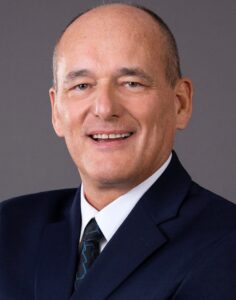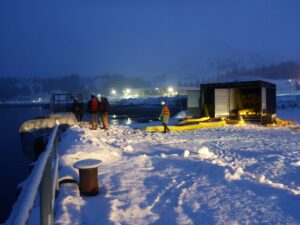
John Kurz became the next President and CEO of Alyeska Pipeline Service Company on April 10, 2023. Kurz follows Interim President Betsy Haines who led the company during the executive search conducted by the Trans Alaska Pipeline System Owners.
Kurz brings over three decades of experience in the oil and gas industry. This includes serving as Senior Operations Manager for Greater Prudhoe Bay in Alaska in addition to multiple executive positions around the world. In his most recent role, Kurz was Chief Operating Officer for Santos and Oil Search in Papua New Guinea. Career highlights include overseeing operations in oil and gas fields, terminals, and pipelines. Kurz has a track record of improving safety and environmental performance and cultivating the next generation of leaders.
“Alyeska is a great company with a rich and proud history and an exciting future,” Kurz said. “Its employees are critical to the State of Alaska, the communities, the upstream and downstream customers we serve, and employees and families who rely on the oil and gas industry for work. Leading an organization and team of this significance is a tremendous responsibility and honor, and I intend to help Alyeska achieve even higher levels of performance.”
Kurz met his spouse in Anchorage, all three of his children were born here, and he holds a Master of Science Degree in Engineering Management from the University of Alaska.
“We have strong connections here,” John said. “It is an incredible opportunity to return home and serve as Alyeska President and CEO.”
In addition to his Prudhoe Bay experience, Kurz served as the executive responsible for operations in Baku, Azerbaijan for the Sangachal Terminal and in Basra, Iraq for the giant Rumaila Field. Kurz previously held other roles in oil and gas in Egypt, Indonesia, and Texas.
“In all my leadership roles, I have worked to inspire the Team to deliver greater performance and results across the board in safety, production, cost, and other business measures, while also leaving an enduring legacy of improvement,” Kurz said.
Including Haines, Kurz is the 13th president to lead Alyeska since its formation in 1970.
Haines, who retired from Alyeska in 2021 after 30 years of service, plans to resume her retirement plans after assisting with the transition to Kurz.
“It has been a privilege to lead this organization as Interim President,” Haines said. “Certainly, when I retired, I didn’t imagine this opportunity, and it was a surprising and wonderful way to end my career. I look forward to bringing John on board as he takes on this new challenge. We’re all looking forward to this next chapter for Alyeska.”
 In April 2023, the Council released an assessment of risks and safety culture at the Valdez Marine Terminal. This report was initiated in June 2022, in response to safety concerns brought to Council staff by current and former Alyeska employees.
In April 2023, the Council released an assessment of risks and safety culture at the Valdez Marine Terminal. This report was initiated in June 2022, in response to safety concerns brought to Council staff by current and former Alyeska employees.